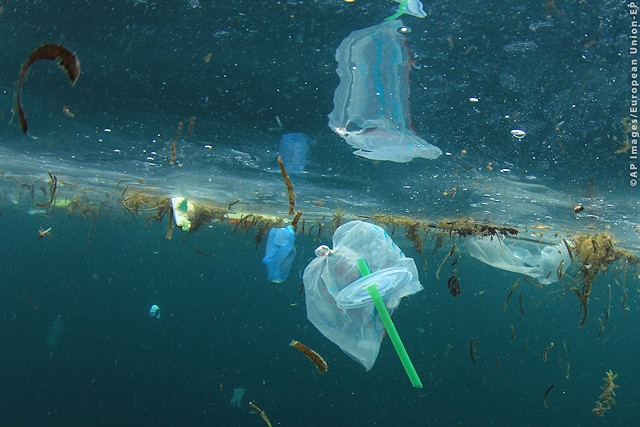More than a third of north west residents have eliminated plastic straws and cups to help environment, study finds
Date published: 18 March 2019

Photo: AP images/European Union -EP
After Blue Planet II aired on BBC in 2017, a public backlash arose against single-use plastics – including drinking straws
More than a third of the north west (39%) have stopped using plastic cups and straws to be more eco-friendly, a new study shows.
The independent research, commissioned by Lightfoot – which produces a device to improve vehicle efficiency – showed that the south west, London and East Anglia have made the most lifestyle changes to benefit the environment, with the north west region ranking eighth.
After Blue Planet II aired on BBC in 2017, a public backlash arose against single-use plastics – including drinking straws, which are typically made from plastics such as polypropylene and polystyrene.
Despite being used for a short period of time, straws were one of the most littered items found during the Marine Conservation Society’s 2017 Great British Beach Clean.
Taking hundreds of years to decompose, plastic is contaminating our waterways and oceans by breaking down into smaller fragments called microplastics, tiny particles (<5mm), which can be ingested by marine life.
Recent research by Bangor University and Friends of the Earth found two rivers in Greater Manchester have the highest levels of microplastic pollution of some of Britain’s most iconic and remote rivers and lakes.
The River Irwell, which flows from Bacup to Salford and has the Roch as a tributary, was found to have 84.8 pieces of plastic per litre, the second highest of the surveyed areas.
Almost half (57%) of those in the north west who were surveyed said they were motivated equally to make lifestyle changes that saved them money or the planet, and 78% consider the environment when making any purchases or lifestyle choices.
More than nine in ten (92%) people in the north west said they have made lifestyle changes for the planet, with almost three-quarters (72%) concerned about their carbon footprint.
The most commonly adopted green practices are recycling (85%) and eliminating plastic (39%). The best thing is to refuse plastics, or re-use to avoid more, but when this just isn’t an option, recycling can avoid further draining of the world’s resources.
Additionally, almost a quarter (24%) of people in the north west are also making a conscious effort to cut down on their meat consumption for environmental reasons, and 25% have started using a reusable coffee cup.
Disposable coffee cups fell under scrutiny when celebrity chef Hugh Fearnley-Whittingstall took to the screen in 2016 with his ‘war on waste’ revolution.
In 2016, Britain learned that an estimated 2.5 billion disposable were thrown away every year: due to the heat and leak-proof mix of plastic and paper in their lining, more than 99.75% of cups are destined for landfill.
As a result, many high-street coffee houses offer a discount for those who bring their own cup.
Since Hugh’s War on Waste aired, Costa Coffee, which has branches in Rochdale and Middleton, accepts any brand of disposable takeaway cups for recycling.
Driving behaviours play less on our minds as an eco-friendly action, as only 25% of those surveyed in the region said they try to drive less for the sake of the environment and 28% make an effort to drive better and more smoothly.
Driving smoothly, with gentle acceleration and braking, uses less fuel than rapid acceleration and heavy braking. Not only does this avoid wear on your vehicle but also uses less fuel – better for both the environment and your pocket.
Mark Roberts, CEO and Founder of Lightfoot said: “The north west is aware of the need for urgent action on climate change, but there still seems to be little awareness around driving behaviours.
“We need to extend our green thinking to our driving style and make a real impact in reducing our emissions through better driving.”
A spokesperson for SeaStraw, a Manchester-based volunteer-run campaign founded by divers and underwater sea photographers who have witnessed plastic pollution first-hand, said: "It's wonderful that so many people in the north west are making positive choices to protect the environment and to reduce the amount of single-use plastic we use.
"Our soils, rivers and oceans are filling with plastic at an alarming rate and heart-breaking images of sea creatures harmed by plastic pollution are motivating us to make small changes to our lifestyle that really do add up.
"Together we are starting to use less plastic, and we need businesses and the government to make it easy for us to make the right choices. Here are some simple things we can do to help the planet:
- Say no to unnecessary plastic such as straws and plastic bags.
- Carry a reusable straw, water bottle, shopping bag, cutlery and coffee cup. It could save you some money.
- Never flush plastic down the loo: always use the bin for cotton buds, wet wipes and sanitary products
- Occasionally pick up litter, from the street or beach - every little helps!
- Buy loose fruit and veg without plastic packaging, and choose organic if possible.
- Try to recycle as much as possible. Then look in your bin - could you buy less of the stuff that can't be recycled?
- Tell your friends that you care about the environment and talk about what you can do to help. Tell your local councillors and MP, too.
"Plastic is a new problem created in the last few decades, and we can fix it quickly too if we all take a few steps to use less."
Do you have a story for us?
Let us know by emailing news@rochdaleonline.co.uk
All contact will be treated in confidence.
Most Viewed News Stories
To contact the Rochdale Online news desk, email news@rochdaleonline.co.uk or visit our news submission page.
To get the latest news on your desktop or mobile, follow Rochdale Online on Twitter and Facebook.

